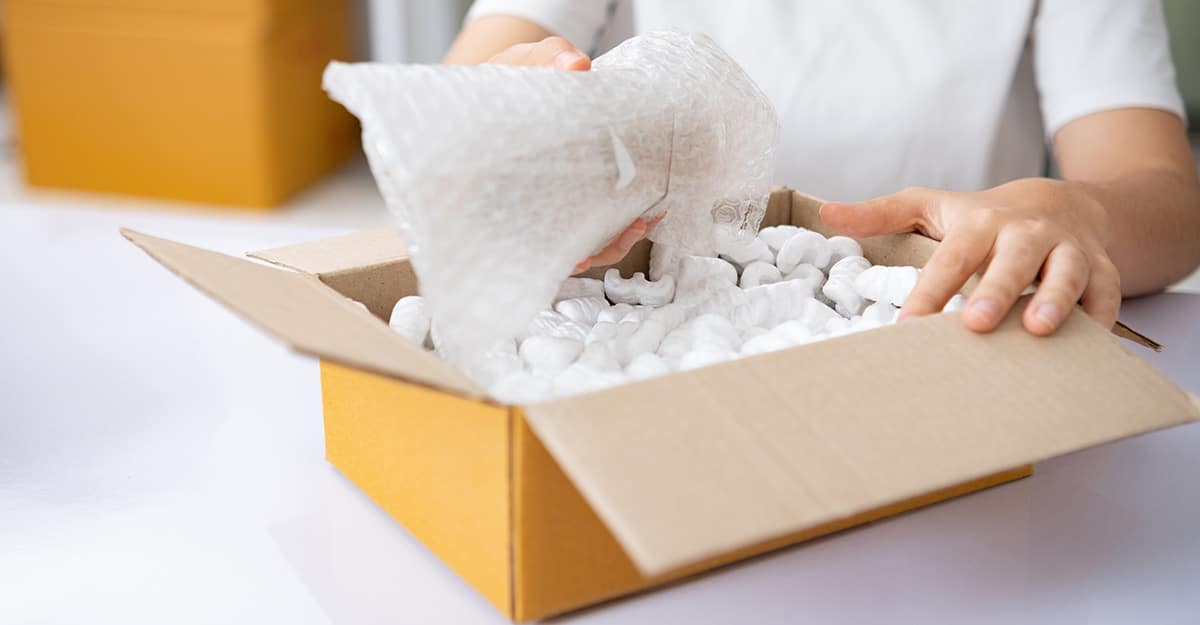Shipping can be a complex process, especially when it comes to ensuring that goods arrive at their destination in perfect condition. One of the critical components in safeguarding your cargo during transit is the use of dunnage. Dunnage is a material used to fill empty spaces, stabilize shipments, and protect goods from damage while they are being transported.
Whether you’re shipping fragile electronics or heavy industrial machinery, dunnage plays a vital role in securing your products and preventing costly damage. But what exactly is dunnage, and why is it so important for shipping? In this article, we’ll break it down for you.
What Is Dunnage?
Dunnage is any material used to support, protect, or fill empty spaces around goods during shipping. Its main purpose is to keep items stable and prevent them from moving or shifting during transit. Think of it as cushioning that absorbs shocks, prevents moisture damage, and keeps everything in place.
Dunnage can be made from a variety of materials, and the type of dunnage used will depend on the specific needs of your shipment. From bubble wrap to wooden blocks to customized foam, there are many options available. The key is to choose the right dunnage to ensure your products remain safe, secure, and undamaged throughout the shipping process.
In this section, we’ll explore the various types of dunnage and explain how each one serves a unique purpose in protecting your cargo.
Why Is Dunnage Used in Shipping?
The main goal of using dunnage is to prevent damage to goods during transportation. During the shipping process, your products can encounter a variety of challenges such as vibration, shock, moisture, and shifting. Dunnage acts as a barrier between your items and these hazards, ensuring that they reach their destination intact.
Here are some of the top reasons why dunnage is essential in shipping:
- Damage Protection: Dunnage helps to prevent physical damage to goods caused by shifting, vibrations, or impacts. It absorbs the shock from drops or rough handling, ensuring that your products don’t get damaged during transit.
- Moisture Protection: If you’re shipping sensitive items like electronics, moisture is one of the biggest threats. Dunnage can provide a protective layer to keep moisture away from your products, preventing corrosion and damage.
- Shock Absorption: Shipping items over long distances often means they are subjected to a variety of movements, from bumps in the road to drops during handling. Dunnage helps absorb the shock from these movements, ensuring your cargo remains stable and undamaged.
- Stabilizing Cargo: Dunnage helps prevent your items from moving around in the container, trailer, or shipping box. When items are left to shift and slide, they are at greater risk of being scratched, broken, or damaged. Dunnage keeps everything securely in place.
- Improved Safety: Dunnage reduces the risk of injury caused by shifting cargo. Unstable loads can fall or cause accidents in warehouses and during transport. Proper use of dunnage helps keep everything safe and secure.
Types of Dunnage Materials
There are several types of dunnage materials, each suited to different needs. Depending on the size, weight, and fragility of your goods, you can choose the most appropriate dunnage material to ensure your shipment arrives in the best condition possible.
Solid Plastics
Solid plastic dunnage is often made from high-density polyethylene and is designed to provide protection for high-value or heavy items. It is resistant to abrasions and can be used to stabilize heavy loads. Although it’s one of the more expensive options, it is often worth the investment when shipping high-value items that require extra protection.
Bubble Wrap
One of the most popular dunnage materials, bubble wrap is known for its cushioning properties. It’s commonly used for fragile items like glass, ceramics, and electronics. Bubble wrap is not only cost-effective but also reusable, making it a smart choice for businesses looking to reduce costs and waste. Simply wrap your items in bubble wrap to create a cushion of air bubbles that absorb shock and prevent damage.
Wood
Wooden blocks and slats are commonly used to stabilize heavy and bulky items. Wood is sturdy and provides reliable protection against impacts, but it is mainly used for heavy shipments. Wood dunnage is often used in industrial shipping, where large and heavy items need to be stabilized.
Air Pillows
Air pillows are inflatable pouches that can be placed inside boxes or containers to prevent shifting. These pillows are especially useful for ecommerce businesses that ship smaller items and need to fill void spaces within packaging. They provide a cushion that prevents products from moving and getting damaged during transit.
Kraft Paper
Kraft paper is a versatile material that’s often used as dunnage because it’s cheap, eco-friendly, and effective. It can be crinkled or shredded and used to fill empty spaces in boxes. Kraft paper works well for lightweight items and provides some protection against moisture. Plus, it’s biodegradable, making it a more environmentally friendly option than plastic-based materials.
Foam
Foam is another popular dunnage material, especially for shipping delicate and fragile items. It’s highly customizable, which means it can be cut to fit the exact shape of the product. Foam inserts are often used to protect electronics, medical equipment, and other sensitive products. The foam can be designed to fit snugly around items to ensure they remain securely in place.
Steel
For extra-heavy shipments or high-value items, steel dunnage may be used. Steel is strong, durable, and provides superior protection. However, it’s also one of the most expensive dunnage options and is typically reserved for shipments requiring extreme protection.
Corrugated Paper
Corrugated paper is another commonly used dunnage material. It is durable and moisture-resistant, making it an ideal choice for a wide range of products. It is often used to fill voids in packaging or to separate products to prevent damage.
Packing Peanuts
Packing peanuts, also known as foam peanuts or foam popcorn, are another type of loose-fill dunnage. They interlock when compressed and provide cushioning that keeps fragile items safe. While packing peanuts are lightweight and cost-effective, they are not the most eco-friendly option and are often replaced by more sustainable materials like air pillows or shredded paper.
Custom Dunnage
For specialized items, custom dunnage solutions can be designed to meet the specific needs of your shipment. Custom dunnage is typically made from foam, plastic, or metal, and it’s tailored to fit the exact dimensions of the products being shipped. Custom dunnage is used when standard options like bubble wrap or foam inserts don’t provide adequate protection.
How to Choose the Right Dunnage for Your Shipment?
Choosing the right dunnage for your shipment depends on several factors, including the weight, fragility, and size of your products. Here are some things to consider when selecting dunnage:
- Fragility of Items: If you’re shipping fragile items like glass, electronics, or ceramics, you’ll want to use a dunnage material that provides excellent shock absorption and cushioning, like bubble wrap, foam, or air pillows.
- Weight of Items: For heavier shipments, you may need stronger materials like wood, plastic, or steel to stabilize the load and prevent shifting.
- Cost-Effectiveness: If you’re looking for a budget-friendly option, kraft paper or bubble wrap can be economical while still providing adequate protection.
- Environmental Impact: If sustainability is a priority, opt for materials like kraft paper, which are biodegradable and recyclable, or air pillows, which can be reused.
The Benefits of Using Dunnage
Using dunnage for your shipments offers several significant advantages:
- Reduces Damage: Proper dunnage prevents your products from shifting, bouncing around, or colliding with other items during transit, reducing the risk of damage.
- Cost Savings: While dunnage does incur some cost, it can save you money in the long run by minimizing the need for replacements or repairs due to damaged goods.
- Improved Customer Satisfaction: Customers appreciate receiving their products in good condition. By ensuring your products are well-protected, you’ll reduce the likelihood of returns and increase customer satisfaction.
- Safety: Dunnage also helps improve the safety of your shipment by preventing cargo from shifting or falling, which can cause accidents during handling or transport.
Final Thoughts
In shipping, dunnage is an essential element that ensures the safety and protection of your goods. Whether you’re shipping fragile electronics or heavy industrial equipment, choosing the right dunnage material can make all the difference in preventing damage and ensuring that your products arrive at their destination in perfect condition.
FAQs
What is the difference between dunnage and packaging materials?
Dunnage is used specifically for stabilizing and protecting goods during transit, while packaging materials are used to contain and wrap the product. Dunnage fills voids or cushions items within the packaging to prevent damage.
Can dunnage be recycled?
Yes, many types of dunnage, such as kraft paper, bubble wrap (if not popped), and corrugated paper, are recyclable. However, materials like foam peanuts or plastic may require special recycling processes and may not be accepted everywhere.
Is there a limit to how much dunnage can be used in one shipment?
There’s no specific limit, but using excessive dunnage could increase shipping costs, take up unnecessary space, and make loading/unloading inefficient. It’s important to balance protection with space optimization to keep costs manageable.
Is dunnage only used in freight shipping?
No, dunnage is not exclusive to freight shipping. It’s also used in smaller-scale shipping for ecommerce businesses, moving fragile items, or storing goods in warehouses, where protection from shifting and damage is crucial.
How do I know what type of dunnage is right for my shipment?
The right type of dunnage depends on your product’s size, fragility, and weight. Fragile items benefit from foam or bubble wrap, while heavier items might need wood or solid plastics. Assess your goods’ needs before choosing dunnage.

I’m Tammy Waller, a supply chain and logistics specialist with over 10 years of expertise. I’ve been an author and SFL employee for over 10 years.
As an author, I’ve been able to teach others. I love guiding users through supply chain and logistics operations.
I have substantial experience managing logistics operations, supply chain management, transportation, inventory management, and warehousing in shipping-moving and logistic services. I’ve worked on many worldwide logistics and supply chain projects, honing my abilities in negotiating rates, scheduling shipments, and managing vendors.



